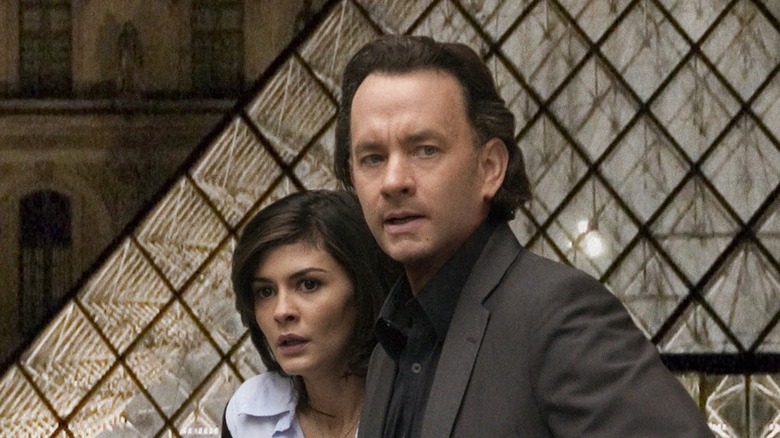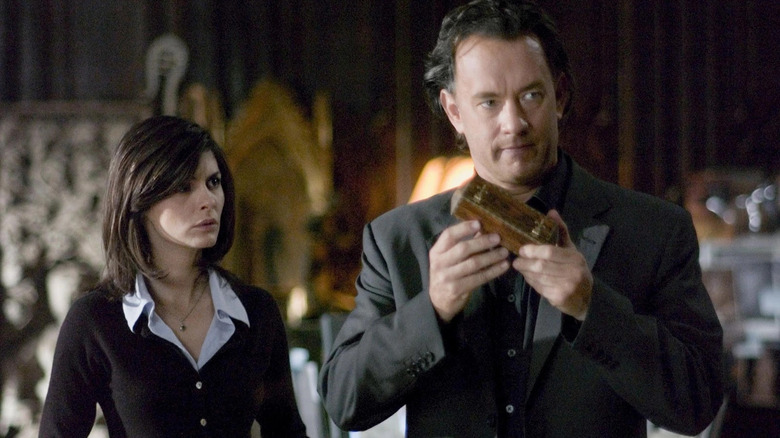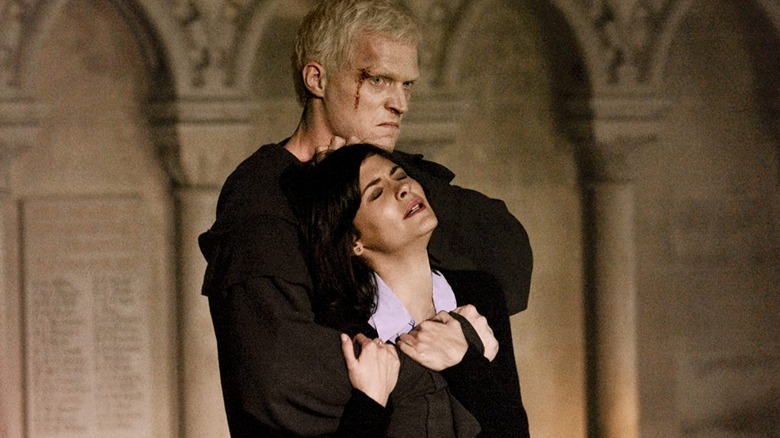Tom Hanks Doesn’t Have Many Nice Things To Say About The Da Vinci Code Trilogy

"So dark, the con of man" is an anagram for "Madonna on the rocks," but it's also an anagram for "a facts-honked moron." It really makes you think.
Ron Howard's 2006 film "The Da Vinci Code," based on the massively successful airport potboiler by Dan Brown, was one of the bigger hits of its year, making $760 million worldwide and briefly becoming a legitimate cultural phenomenon. There was a time when everyone in the United States had a copy of Brown's book on their nightstand. It almost seemed to be a suburban standard issue, like a Gideon Bible. The "Da Vinci" craze was a phenomenon that was to fizzle quickly, however, and it wasn't long before local Goodwills were choked with hundreds of used "Da Vinci" copies each.
While the success of "Da Vinci" required Brown and Paramount to put a sequel into production — "Angels & Demons" was released in 2009 — the original was already receding in the public's estimation, and other, better clue-hunting novels were being brought into the conversation: Umberto Eco's 1988 novel "Foucault's Pendulum" was touted as the superior "conspiracies hidden in the history of the Christian church" thriller by its fans. By 2022, all three of the "Da Vinci" movies ("Inferno" was released in 2016), Da Vinci fever had officially worn off and the public could now look back at how bad that first movie really was.
One such reflection came from Tom Hanks himself. Hanks played professional "symbologist" Robert Langdon in all three "Da Vinci" movies, and, in an interview with the New York Times Magazine, lambasted the series as — in the harshest possible language for Hanks — "hooey."
Hooey

"The Da Vinci Code" is little more than a slightly more adult-friendly version of lighthearted kids' swashbuckling pulp like "National Treasure" from 2004. In the film, Langdon becomes the prime suspect in a puzzle-related murder in the Louvre and goes on the run with the victim's granddaughter (Audrey Tatou), a cryptographer in her own right. Their quest will be to examine symbols and treasure hunt clues in the works of Leonardo Da Vinci in order to locate nothing less than the Holy Grail. On their tail are the police, but also a creepy agent of the Catholic Church who must protect certain secrets, lest the tenets of Christianity be rewritten. The film's religious themes got it in trouble with some Catholic groups around the globe, but it was only ever a minor stir of controversy.
Looking back, Hanks realized how silly the entire enterprise was, lambasting the film's lack of historical accuracy and clunky, dumb commercial appeal.
"God, that was a commercial enterprise. Yeah, those Robert Langdon sequels are hooey. 'The Da Vinci Code' was hooey ... I mean, Dan Brown, God bless him, says, 'Here is a sculpture in a place in Paris! No, it's way over there. See how a cross is formed on a map? Well, it's sort of a cross.' Those are delightful scavenger hunts that are about as accurate to history as the James Bond movies are to espionage ... All we were doing is promising a diversion."
Although, to be fair, it was a very successful diversion.
Commercial Cynicism

Hanks, while acknowledging that there was more commercialism than cleverness in "The Da Vinci Code" movies, remained tactfully pragmatic about commercial entertainments in general; goodness knows Hanks himself hasn't appeared in broadly appealing commercial products outside of "Da Vinci." He feels that as long as a series is making a great deal of money, it at least makes good financial sense to keep making follow-ups, even if the art of the thing has long since been left behind.
"There's nothing wrong with good commerce, provided it is good commerce. By the time we made the third one, we proved that it wasn't such good commerce. Let me tell you something else about 'The Da Vinci Code.' It was my 40th-something birthday. We were shooting in the Louvre at night. I changed my pants in front of the Mona Lisa! They brought me a birthday cake in the Grand Salon! Who gets to have that experience? Any cynicism there? Hell no!"
The third film in the Langdon series, "Inferno," opened to a paltry $14 million in the United States, on a $75 million budget, and while it did ultimately surpass $220 worldwide, it was considered a disappointment, so Hanks' statement remains true.
As for changing in front of the Mona Lisa, Hanks may be disappointed to learn that the actual Mona Lisa was replaced by a replica for filming. In 2006 Michael Haag and Veronica Haag book "The Rough Guide to The Da Vinci Code: An Unauthorized Guide to the Book and Movie," the authors explain that Da Vinci's painting was too sensitive to a film crew's lights, and the actual painting was stored during the duration of filming. On his 49th birthday, Hanks merely changed his pants in front of a copy of the Mona Lisa.
Which, one might argue, is still not nothing.
Read this next: The Best Movies Streaming Right Now: Malignant, A Hero, And More
The post Tom Hanks Doesn't Have Many Nice Things to Say About The Da Vinci Code Trilogy appeared first on /Film.
